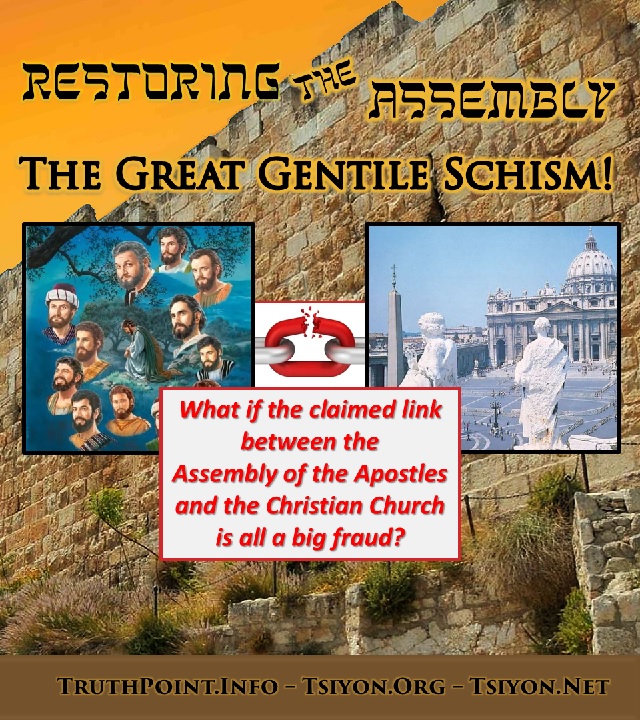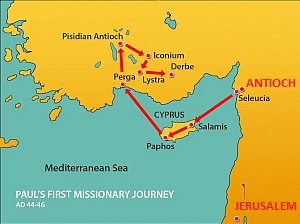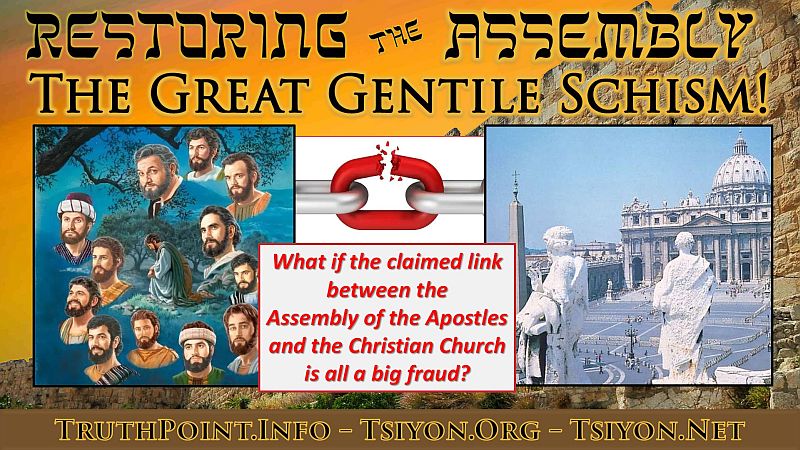|
|
|||||
~ Pass this newsletter on to a friend! ~ |
Every Sabbath | ||||
 | |||||
 | |||||
Keep Tsiyon Road | |||||
|
Join us online tonight! |
See the premier | ||||
|
| |||||
| |||||
|
**************************************** From Eliyahu Consider this:
Same word - Different meaning: From the mid 2nd Century onward, the Greek word Christianos was used in a new way, which does not mean the same thing as the Bible word. Words and their meanings do change, and sometimes are deliberately changed, to deceive people. Most recently the word "marriage" is the best example. For thousands of years "marriage" meant a holy bond between a man and a woman. In 2015 the Supreme Court of the United States changed the definition to include same-sex relationships. That means, the original word "marriage" as we find it in the Bible is really a different word than "marriage" in the revised American English language of 2015 onward. The same word-morphing process is true of the Greek word Christianos translated "Christian." Here is Strong's definition of that word:
The word most literally means "of Messiah" - "Christos" being the Greek word for "Messiah." That's why some Bibles translate the Greek word Christianos as Messianic, such as the HNV and the CJB. Now, let's look at these three verses. The word means Messianic, about Israel's Messiah: Here is the first occurrence of this word in the Bible:
Now that we have this history, let's add in the next few verses of the passage for context:
Notice that the Assembly in Antioch had been raised up by Jewish believers from the HQ in Jerusalem. The Antioch Assembly worked through the established order of leadership, sending relief funds from Antioch to the elders in Jerusalem (Primarily to James and those with him) through their Jerusalem representatives, Barnabus and Saul. All of this was because they were not only believers in Messiah - they were citizens of Messiah's Kingdom, that is to say, citizens of the True Israel, then headquartered in Jerusalem, under the Davidic leadership of James, the Lord's brother. Antioch was perfectly situated to become the launching point for the Kingdom of Messiah to go north and west into the Roman world, all in good order, tying in every new Assembly with the existing Kingdom government.
King Agrippa was a Jew who believed the prophets. Was Paul trying to persuade Agrippa to join some rival new religion called "Christian"? - Or was Paul showing Agrippa that by being a Jew who already believes the prophets that he, as a Jew, should now embrace the One the prophets foretold, the Messiah? The word Christianos as used here means a Jew who believes in Yeshua as the Messiah, a Messianic Jew. The last use of the word Christianos also refers to Hebraic Messianics: Now, here is the third and last use of the Greek word Christianos in all of the Scriptures:
To correctly understand this passage we must understand who Peter was writing to. Here is Peter's introduction to this letter: "Peter, an emissary of Yeshua the Messiah, to the chosen ones who are living as foreigners in the Diaspora in Pontus, Galatia, Cappadocia, Asia, and Bithynia.." [1 Peter 1:1-2 HNV]
Now, we've looked at all three passages where the Greek word Christianos is used. In all three places it refers to Israelite believers in Messiah - Messianics! This is the Israel of God under Messianic Authority! The passages revealed that these Messianic believers were all organized as part of the renewed Israelite nation led by James. In that organized sense, they were an Israelite nation, the Kingdom of Messiah, separate from the world and unified as one body under Messiah's Kingdom government. Translating Christianos as "Christian" is misleading, because it does not mean any of that today, in the English language. One word of caution though, much called Messianic today is really the Christian Church dressed up in Jewish clothing. One must dig deeper than mere labels to find the real Israel of God. [Gal 6:16] While the word Christian today can mean a follower of Christ, it does not stop there, but also means:
It is easily proven that these 2nd Century Gentile "Christians" outnumbered the original Hebraic Messianic believers by a large margin, so were easily able to redefine the word Christian to refer to themselves, making it appear they were the original group. They weren't. They were a break-off faction from the original movement, a schism, a mutation, a monstrosity. They totally rejected the authority structure given by Messiah Himself to the original believing Israelite movement, of which they were no longer a part. The original group of Hebraic Nazareans (Messianics) from whom the "Christians" broke away continued on to at least the 4th Century, after which they were driven permanently underground by the persecutions against them by the rebel "Christians." This could happen because power loves a vacuum. By throwing off true Messianic authority in the 2nd Century the Gentile Christians created a power vacuum filled later by a false authority in the 4th Century. This is the Christian Church that became a new religion - that did not exist in the 1st Century. [Luke 22:30, Acts 26:4-8, James 1:1, Romans 11, Rev 21:12]
What does He want? Most Christians don't have a clue about what He wants, and many if not most, don't care. For most of them, it's all about what they want. In all too many cases, once they think they have got "salvation" nailed down, they just want to live their lives, follow their dream, and be part of the world. Sure, they want to "make the world a better place" but is "making the world a better place" what He is after? [1 Cor 3:1-3, Heb 5:12-14, 1 Jn 2:15] Being a Christian in the modern sense of the word may mean you have put your faith in the Son of God and are saved. It can just as easily mean you go to Church, yet you have never known Christ. In either case, the Christian Church has cut itself off from Kingdom authority, and leaves out so much of God's will and purposes that it has to be discarded for His purposes to be fulfilled. [Matt 7:21-23] The Gentile Christian Church lacks the one thing that is vital to success - Kingdom authority! To restore the Assembly will require bypassing the Christian heresy of the 2nd Century in its modern form, and returning to the primitive faith of Israel with Messiah and those He appoints at the helm. In case you don't know, what YHWH wants is a restored nation of believing Israel in this world to represent Him! [Jude 1:3] Messiah is about His Father's business - not yours! Messiah's Kingdom is about Him - not you! Yes, we can be included through Messiah, no matter who we are since Gentiles can be grafted in to Israel. That is a privilege, not a right. Those who are ultimately included in this privilege can only be those who lay down their lives for His Life - to accomplish His purposes. Life as a disciple is about fulfilling works of faith for Him and His Kingdom - not a big unending party. If the party with the world is what you are looking for, go be a modern-day Christian. If what you want is what He wants, this is the place to be. [Luke 2:49, 14:25, 26, 33, Eph 2:11-13, Romans 11] Get the facts. See the premier of our new re-mastered video entitled: The Great Gentile Schism! This message will show you the origin of the Gentile Christian Church, in historic detail. By learning the mistakes of the past we can more easily see where the problems must be solved for the Assembly to be restored. This is the will and purpose of Messiah. Join us for our live meeting to be aired tonight, at tsiyon.net, at 8 pm cst. Invite your friends to register free of charge and join us for this special meeting. This latest video is vital to seeing where we need to go to set things right. Blessings and good health to you! Eliyahu P.S. - Changing words can't change the facts. This is what really happened! | |||||
| |||||||
©2020 Tsiyon - Tsiyon A130-425, 5701 W Slaughter LN, Austin, TX, USA, 78749 You may leave feedback, prayer requests and comments here. Please donate online here. | |||||||








 There are
only three places in all of Scripture which use the Greek word Christianos,
often translated in English translations as "Christian." Inevitably,
after seeing the title of my last video, "Paul: Never Part of the Christian
Church", some of my Christian friends cited these three verses as proof that
the Christian Church existed in the 1st Century. That's why they need to see tonight's video
entitled "The Great Gentile Schism!"
There are
only three places in all of Scripture which use the Greek word Christianos,
often translated in English translations as "Christian." Inevitably,
after seeing the title of my last video, "Paul: Never Part of the Christian
Church", some of my Christian friends cited these three verses as proof that
the Christian Church existed in the 1st Century. That's why they need to see tonight's video
entitled "The Great Gentile Schism!"  Barnabas and Saul were both Jewish believers in
Messiah. Earlier Peter had evangelized the Assembly in Antioch, and Barnabas
and Saul were going there to help get that Assembly firmly established. The
believers in Antioch were Hebraic believers in Messiah, as this quote sums up:
Barnabas and Saul were both Jewish believers in
Messiah. Earlier Peter had evangelized the Assembly in Antioch, and Barnabas
and Saul were going there to help get that Assembly firmly established. The
believers in Antioch were Hebraic believers in Messiah, as this quote sums up: Here
Messianic means a believing Jew: Look at the next verse that uses the Greek word Christianos:
Here
Messianic means a believing Jew: Look at the next verse that uses the Greek word Christianos: The Diaspora is a term referring to scattered
Israel, mostly living in the Jewish communities located throughout the Roman
empire. In 1 Peter 4:14-17 above, Peter was talking about the
persecution the believers were receiving from the unbelieving Jews in
the Jewish communities in which they lived. What was the stumbling block?
Peter's readers professed faith in Yeshua as the Messiah, while the rest of
the Jewish community did not. Messianic in this case, refers to
Messianic Israelites who were suffering persecution and ridicule from the
unbelieving Jewish community. This is why Peter states: "For the time has
come for judgment to begin with the household of God" - the Household of God
in this context is the whole Israelite nation being divided by belief in
Yeshua as the Messiah. The believing Israelites would be saved and the
unbelieving would not. Those who "don't obey the Good News of God" in this
context, refers to Gentiles who were considered completely ignorant and disobedient to
the Word [Torah, Writings, and Prophets] previously given to Israel, all of
which is part of the "Good News of God."
The Diaspora is a term referring to scattered
Israel, mostly living in the Jewish communities located throughout the Roman
empire. In 1 Peter 4:14-17 above, Peter was talking about the
persecution the believers were receiving from the unbelieving Jews in
the Jewish communities in which they lived. What was the stumbling block?
Peter's readers professed faith in Yeshua as the Messiah, while the rest of
the Jewish community did not. Messianic in this case, refers to
Messianic Israelites who were suffering persecution and ridicule from the
unbelieving Jewish community. This is why Peter states: "For the time has
come for judgment to begin with the household of God" - the Household of God
in this context is the whole Israelite nation being divided by belief in
Yeshua as the Messiah. The believing Israelites would be saved and the
unbelieving would not. Those who "don't obey the Good News of God" in this
context, refers to Gentiles who were considered completely ignorant and disobedient to
the Word [Torah, Writings, and Prophets] previously given to Israel, all of
which is part of the "Good News of God."  When
and how did the word Christian change from its Biblical sense to mean
a new Gentile Religion? - for such it has been for a very long time.
Christianity in this changed sense of the word began in the 2nd century
when Gentiles adopted a version of the Christ story as a new philosophy,
which they mixed with other philosophies of the day, such as Platonist,
Aristotelian, Stoic, and Epicurean, as well as importing pagan
religious themes and practices. These Gentiles hated all things Israel, and didn't want
to be required to "obey the Good News of God" under the rule of Messiah's
Kingdom - so the wild branches broke away from the root of the tree, to
produce wild fruit. Christianity as a philosophy allowed them to go on
living their lives according to their own emotions and desires, feeling they
were "saved" - but still free to be a part of the world. Pagan
philosophy and religion always catered to the emotional and material needs of
man. No pagan worshipper ever loved the gods. It was all about manipulating the
gods to fulfill one's own needs and wishes. It was natural for the Gentile
pagans to bring their version of Christ into their pantheon, as another resource
they could manipulate for their own use. This is how so much pagan thinking and
practice came into the Gentile Christian Church, and remains inseparable from it
today. [Romans 11:11-24, James 4:4]
When
and how did the word Christian change from its Biblical sense to mean
a new Gentile Religion? - for such it has been for a very long time.
Christianity in this changed sense of the word began in the 2nd century
when Gentiles adopted a version of the Christ story as a new philosophy,
which they mixed with other philosophies of the day, such as Platonist,
Aristotelian, Stoic, and Epicurean, as well as importing pagan
religious themes and practices. These Gentiles hated all things Israel, and didn't want
to be required to "obey the Good News of God" under the rule of Messiah's
Kingdom - so the wild branches broke away from the root of the tree, to
produce wild fruit. Christianity as a philosophy allowed them to go on
living their lives according to their own emotions and desires, feeling they
were "saved" - but still free to be a part of the world. Pagan
philosophy and religion always catered to the emotional and material needs of
man. No pagan worshipper ever loved the gods. It was all about manipulating the
gods to fulfill one's own needs and wishes. It was natural for the Gentile
pagans to bring their version of Christ into their pantheon, as another resource
they could manipulate for their own use. This is how so much pagan thinking and
practice came into the Gentile Christian Church, and remains inseparable from it
today. [Romans 11:11-24, James 4:4] This
historic origin continues to prevent
Christianity from ever being able to accomplish the purposes of Messiah.
Why? A lot of reasons, not the least of which is its selfish personal focus
inherited from the pagans. Christianity is obsessed with offering personal
"salvation" all as part of a "personal" relationship with Christ.
At first this sounds good, but often in practice this is all about you and what you want
- getting Christ to personally serve you. This selfish focus may be attractive to
spiritual babies, but true believers are expected to grow beyond the milk to
the meat. The meat has to do with you serving Him! Discipleship is not about
using Christ, but requires obedience to the will of YHWH and His
Messiah as a mature disciple. Our focus should be on what He wants - not
what we want!
This
historic origin continues to prevent
Christianity from ever being able to accomplish the purposes of Messiah.
Why? A lot of reasons, not the least of which is its selfish personal focus
inherited from the pagans. Christianity is obsessed with offering personal
"salvation" all as part of a "personal" relationship with Christ.
At first this sounds good, but often in practice this is all about you and what you want
- getting Christ to personally serve you. This selfish focus may be attractive to
spiritual babies, but true believers are expected to grow beyond the milk to
the meat. The meat has to do with you serving Him! Discipleship is not about
using Christ, but requires obedience to the will of YHWH and His
Messiah as a mature disciple. Our focus should be on what He wants - not
what we want! 




















